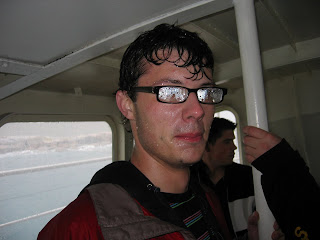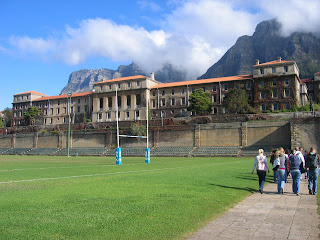In the interest of time I am going to skim over some days during this blog entry and come back to them in greater depth later. Tomorrow, Wednesday, and Thursday nights will be spent in homestays with members of the Gugulethu township community, which we visited for the first time today. Consequently, I will not have the opportunity to make more blog entries for at least 3 or 4 days. I would like to quickly summarize the events of the last four days, which included some very fun activities, and then express some of my first impressions of the township environment.
Thursday, May 29th was spent on a bus tour of the Cape of Good Hope and the seaside communities near Cape Town. During the trip, we got soaked on a boat ride out to some rocks to see seals, which was interesting. We also stopped around lunch time at a park and looked at penguins. The highlight of the trip involved a trip to the Cape of Good Hope national park, which included a hike down to a really cool beach with huge waves and a hike along the rocks to the most Southwestern point on the African continent, during we got rained on for the second time of the day. The drive along the coast was picturesque, and most of the day was a beautiful journey through some of South Africa’s most scenic areas.
Friday, May 30th began with another lecture at UCT, given by Steve ….. He talked about his life and studies all over the world. His parents were members the African National Congress, which was the major anti-apartheid group in South African, so they were exiled from the country. Steve related many of his experiences and talked at length about the work he is doing with conflict resolution all around the world. It was a really cool lecture that brought the light of personal struggle to Wednesday’s more academically framed discussion. Steve was also a really cool guy.
Saturday, May 31st included a Safari, which was really cool. It began with tea and crackers at an isolated, ritzy compound in the middle of the bush. We then boarded some very safari-esque land rovers and set off into the bush. Our first stops were at some isolated lion and cheetah cages, and it was really cool to get close to such beautiful animals. We then headed into nature preserve, which was 40,000 hectares in size (pretty big apparently). We saw giraffes, zebra, kudu, water buffalo, rhinos, and springbok (the national animal of South Africa). It was wonderful to the all the animals roaming their natural ranges, and we had a particularly good day in general as far as finding the animals.
Saturday night was particularly fun. We went to dinner at a traditional African restaurant in Cape Town, which featured some cool live music. We then went out to the clubs all night, which was an absolute blast. The atmosphere around Cape Town was really exciting, and we visited three different clubs, which became progressively more fun as the night got later. It was a good time for sure.
On Sunday we woke up early and went to church at the JL Zwane community center in the economically depressed township of Gugulethu. We got to meet our host families for our home stays and then attended the service at the church at the community center. It was very soulful, and the host families were thrilled to meet us, which was nice. I definitely felt immediately accepted by the people at JL Zwane, and it was refreshing to feel the warmth of the community overflowing for the congregation at the service. Relaxing all afternoon was equally valuable, as we have not had much time to just relax and let things settle. It felt good to just allow my mind to rest and my body to equalize.
Monday, June 2nd was also a powerful day as far as gaining new insights into the nature of the townships. Reverend Spiwo Xapile’s perspective on leadership was particularly powerful, as he discussed the nature of the individual with respect to both the community and the world at large. I loved his ideas about leadership, demonstrating that a person can motivate others to rise above their surroundings to overcome their cultural expectations to achieve great things (in his case the establishment of the community center and the promotion of AIDS activism). I am excited to continue learning from him about the nature of his spirituality and how it influences the way he acts as a leader. We also toured the township, and the poverty was somewhat overwhelming. It was also exciting to see how things have progressed since the dissolution of apartheid. It is clear that things have been getting better all the time.
As a further note, I am not posting any pictures with this one, as I did not carry my camera. However, I will be collecting photos from my friends and posting them after my home-stays. I apologize for the loss of thousands of words. Regardless, I hope this sheds some light on the experience I have been having, and I will post again (including pictures relating to this blog) as soon as I return from the home-stay experience.

 I love this picture!
I love this picture!  This is a picture outside of the first winery we visited. It was pretty much gorgeous and pristine.
This is a picture outside of the first winery we visited. It was pretty much gorgeous and pristine. Here is a picture of everyone at the wine tasting itself. We were having a good time drinking wine. Our guide was named Victor, and he was awesome.
Here is a picture of everyone at the wine tasting itself. We were having a good time drinking wine. Our guide was named Victor, and he was awesome. Here is a picture of Kate on the way home from our day. I just like the look on her face combined with the hilarious painting!
Here is a picture of Kate on the way home from our day. I just like the look on her face combined with the hilarious painting! The day of wine tasting was a lot of fun. The only sad thing was that our instructor Aaron got motion sickness and could not really enjoy the wine. Otherwise, the weather was beautiful and the Stellenbosche region was really nice.
The day of wine tasting was a lot of fun. The only sad thing was that our instructor Aaron got motion sickness and could not really enjoy the wine. Otherwise, the weather was beautiful and the Stellenbosche region was really nice.




























